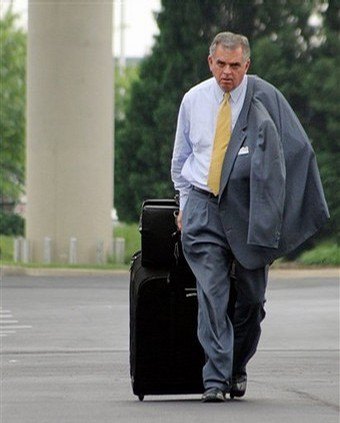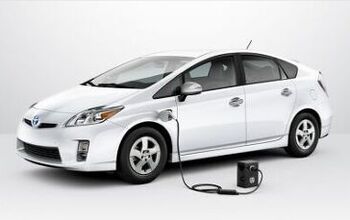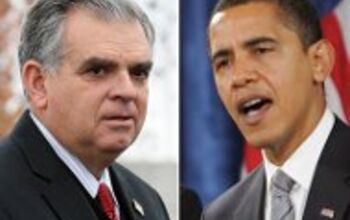Transportation Secretary Considers Pay-Per-Mile Tax
Transportation Secretary Ray La Hood is considering a transportation tax based on miles driven, to replace gasoline tax revenue. “We should look at the vehicular miles program where people are actually clocked on the number of miles that they traveled,” La Hood tells the Freep, echoing proposals being considered by Oregon, Idaho, Rhode Island, Massachusetts and North Carolina. La Hood argues that gasoline tax revenues “can not be relied on” to fund infrastructure maintenance, presumably because relatively high prices have caused a downturn in gas tax revenue. “One of the things I think everyone agrees with around reauthorization of the highway bill is that the highway trust fund is an antiquated system for funding our highways,” LaHood said. “It did work to build the interstate system and it was very effective, there’s no question about that. But the big question now is, We’re into the 21st Century and how are we going to take care of our infrastructure needs … with a highway trust fund that had to be plused up by $8 billion by Congress last year?” For La Hood the answer to that rhetorical question is “by putting GPS chips in your car and charging you by the mile.”
LaHood has firmly ruled out increasing the gas tax “in a recession,” but Vehicle Miles Traveled (VMT) is hardly a short-term solution. According to Rob Atkinson, president of the National Surface Transportation Infrastructure Financing Commission (the guy who figures out how to fund infrastructure) says it will take the better part of a decade to impliment a national VMT scheme. By then the “recession” argument against increasing the gas tax should be gone, and conveniently that method would avoid having to build, maintain and monitor millions of GPS chips. Meanwhile, the only real argument against raising the tax on gas (for which demand is quite inelastic) is political cowardice. La Hood might consider the VMT scheme “thinking outside the box,” but an enormous infrastructure of GPS chip makers, monitors, maintenance, and assessors (not to mention the possibility of privacy intrusions, a notion La Hood airly dismisses) is hardly a streamlined, efficient approach to the problem.
More by Edward Niedermeyer
Latest Car Reviews
Read moreLatest Product Reviews
Read moreRecent Comments
- Ras815 The low-ish combined EPA rating on the hybrid version might be a bit misleading - I'd imagine in a real-world case, you could see a substantial improvement in around-town driving/hauling compared to the gas equivalent.
- Lim65787364 Melissa needs to be get my money back up and for new car payment
- 3-On-The-Tree Lou_BCAnd at the top for critical shortage’s to include law enforcement.
- Analoggrotto Kia Tasman is waiting to offer the value quotient to the discerning consumer and those who have provided healthy loyalty numbers thinks to class winning product such as Telluride, Sorento, Sportage and more. Vehicles like this overpriced third world junker are for people who take out massive loans and pay it down for 84 months while Kia buyers of grand affluence choose shorter lease terms to stay fresh and hip with the latest excellence of HMC.
- SCE to AUX That terrible fuel economy hardly seems worth the premium for the hybrid.Toyota is definitely going upmarket with the new Tacoma; we'll see if they've gone too far for people's wallets.As for the towing capacity - I don't see a meaningful difference between 6800 lbs and 6000 lbs. If you routinely tow that much, you should probably upgrade your vehicle to gain a little margin.As for the Maverick - I doubt it's being cross-shopped with the Tacoma very much. Its closest competitor seems to be the Santa Cruz.


































Comments
Join the conversation